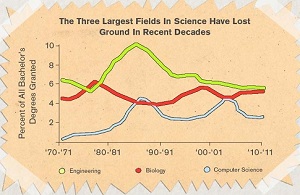Klint Finley
Latest from Klint Finley
Who Was the First Data Scientist?
Astronomer Tobias Mayer, born 1723, was the first data scientist John Rauser, a data scientist at Amazon.com, explained in a talk at Strata. Mayer explained the motion of the moon using spherical motion trigonometry. In order to do this, Mayer compiled nine times as many data points as necessary (27 instead of three). Mayer claimed ...
Devs vs. Ops: Sushi vs. Meat and Potatoes
One of the criticism of DevOps we hear often is that it’s too focused on getting operations to change according to what developers want than getting developers to adjust to the realities that constrain operations. For example, Circonus CEO Theo Schlossangle made this point on theCube earlier this year. There are exceptions. J. Wolfgang Goerlich ...
Red Hat Finally Open Sources OpenShift PaaS
Red Hat, known for keeping its enterprise distribution completely open source and still becoming the first $1 billion open source company, finally released the source code for its OpenShift platform-as-a-service. Red Hat launched the OpenShift beta in May 2011, but despite the company’s open source pedigree, it has remained closed source until now. Part of ...
Windows Port of Redis Updated by Microsoft Subsidiary
Microsoft Open Technologies, a Microsoft subsidiary that launched earlier this month, has released its first project: a new version of the Windows port of Redis begun by Microsoft. However, it’s not yet production ready. Previously Microsoft submitted a patch to provide Windows support in the main Redis project, based on an existing port of Redis ...
Programming Language Popularity Based On O’Reilly Book Sales
O’Reilly’s Mike Hendrickson has published some interesting data about the company’s programming book sales. I previously looked at Hacker News poll on readers’ favorite languages and compared it to RedMonk’s analysis of programming language use on Github and questions on StackOverflow. Looking at the popularity of languages amongst programmers can help companies decide what languages ...
60% of STEM Students Change Majors and 43% of STEM Graduates Work In Other Fields [Infographic]
Of those that graduate with STEM (science, technology, engineering and mathematics) degrees 43% end up working in other fields. Those figures are from an infographic that draws on reporting from The New York Times and a study from Georgetown University. The statistics paint a dismal picture. According to The Times: “Studies have found that roughly ...
Firebase Invites for DevOpsAngle Readers
Earlier today I told you about Firebase, a new hosted NoSQL database, and how it fits into the new client-centric application development paradigm. Firebase is still in private beta, but if you’d like to check it out early e-mail angle@klintfinley.com. The first ten people to e-mail will get a beta invite.
Pushing Data, Not Pages is the New Model for Application Development
A crop of tools for building applications in a new way has emerged over the past month. The way developers build applications has changed over the past few years. The old client-server model involved doing most of the work on the server side and then piping the results down to a dumb client. That might ...
Yammer Adds Universal Search, Takes a Step Closer to Being the Information Cortex
Today Yammer announced a few new features, most notably the ability to return search results from external applications from within Yammer. Yammer has been been working to build integrations with other business applications such as SAP, Netsuite, Salesforce.com and Microsoft SharePoint, either through partnerships or on its own. Now Yammer can display records and content ...
Use IRC to Improve Collaboration in DevOps Groups
A while back we asked what tools your DevOps team uses to collaborate. IRC, Skype other chat tools were high on the list. It’s clear that text chat is an important tool for collaboration. In a recent piece on how the Puppet Labs operations team uses IRC, VP Tech Operations James Turnbull writes: For me ...














